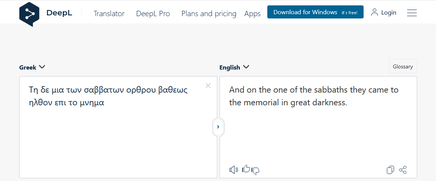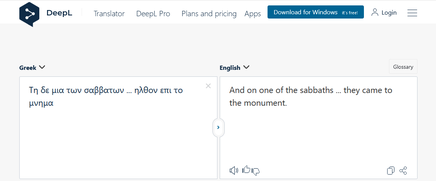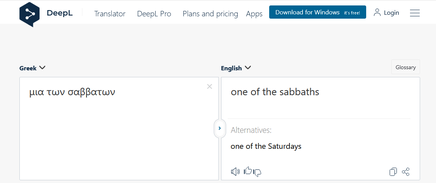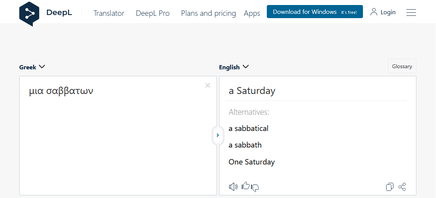- Home
- English
- Structure of the Bible
- Structure of the Menorah
- Ancient Menorahs
- Calendar and Feasts
- Resurrection on Sabbath
- Introduction
- Day
- Sabbath
- High Sabbath
- Pre-Sabbath
- Week
- Interlinear Bible
- Church Opinions
- 1. No Sunday
- 2. A Sabbath
- 3. No Friday
- 4. Intermediate Day
- 5. Three Days and Three Nights
- 6. Manipulations
- 6.1 Sabbath not Sunday
- 6.2 Plural σαββατων not week
- 6.3 one not first
- 6.5 Day of the Sabbaths
- 6.7 Lords Day
- 7. Old Bibles
- Greek Bibles
- Latin Bibles
- Gothic Bible
- English Manuscripts
- English Bible Prints 1
- English Bible Prints 2
- English Bible Prints 3
- English Bible Prints 4
- German Manuscripts
- German Bible Prints 1
- German Bible Prints 2
- Spanish Bibles
- Italian Bibles
- Swedish Bibles
- μια των σαββατων
- Mt 28-1
- Mk 16-2
- Mk 16-9
- Lk 24-1
- John 20-1
- John 20-19
- Acts 20-7
- 1Cor 16-2
- Lk 18-12
- 7 Languages
- Palm Sabbath
- Omer
- Summary
- The Rapture
- Rabbi Kaduri Note
- 666
- 888
- Video
- Info
- Francais
- Deutsch
- Espanol
- Dutch
- Ελληνική
- Pусский
- Introduction
- Day
- Sabbath
- High Sabbath
- Pre-Sabbath
- Week
- Interlinear Bible
- Church Opinions
- 1. No Sunday
- 2. A Sabbath
- 3. No Friday
- 4. Intermediate Day
- 5. Three Days and Three Nights
- 6. Manipulations
- 6.1 Sabbath not Sunday
- 6.2 Plural σαββατων not week
- 6.3 one not first
- 6.5 Day of the Sabbaths
- 6.7 Lords Day
- 7. Old Bibles
- Greek Bibles
- Latin Bibles
- Gothic Bible
- English Manuscripts
- English Bible Prints 1
- English Bible Prints 2
- English Bible Prints 3
- English Bible Prints 4
- German Manuscripts
- German Bible Prints 1
- German Bible Prints 2
- Spanish Bibles
- Italian Bibles
- Swedish Bibles
- μια των σαββατων
- Mt 28-1
- Mk 16-2
- Mk 16-9
- Lk 24-1
- John 20-1
- John 20-19
- Acts 20-7
- 1Cor 16-2
- Lk 18-12
- 7 Languages
- Palm Sabbath
- Omer
- Summary
Lk 24:1 - The Women Came to the Tomb on a Sabbath
Lk 24:1: „Now upon the first day of the week, very early in the morning, they came unto the sepulchre, bringing the spices which they had prepared“ - This is the text of the King James Bible (KJV), but the basic Greek text speaks of a completely different day, namely of a Sabbath. Below are the Greek words with pronunciation (transcription) and literal translation:
τη (te; on/the) δε (de; but) μια (mia; one) των (ton; of the) σαββατων (sabbaton; Sabbath/s or sabbath) ορθρου βαθεως (orthrou batheos; dawn deep) επι (epi; to) το (to; the) μνημα (mnema; tomb) ηλθον (elthon; they came)...
The translation is very easy: „But on one of the Sabbaths (or: on one of the Sabbath days or: on a Sabbath), at the deep dawn they came to the tomb...“
Six Translation Errors in Only One Sentence
The comparison of the basic Greek text with the King James Bible reveals that in support of the alleged Sunday resurrection of Jesus, six translation errors were made in one sentence:
1. one (μια = mia) has been removed from the Bible (mia is a cardinal number)
2. first (πρωτη = prote) was added to the Bible (prote is an ordinal number)
3. Sabbath/s (σαββατων = sabbaton) has been removed from the Bible
4. day (ημερα = hemera) was added to the Bible; a new day instead of the Sabbath day
5. week (εβδομαδα = ebdomada) has been added to the Bible
6. Sunday (ημερα του ηλιου or ηλίου ημερα = heliou hemera) was added in some Bibles
However, there are many Catholic and Protestant Bibles that have been translated correctly (see below).
The Facts Concerning Lk 24:1
All basic Greek texts, that is to say the Textus Receptus (TR), Codes Sinaiticus (CS), Majority Text and Neste-Aland (NA28), have the same word order in Mk 16:2; Lk 24:1; Jn 20:1 and Acts 20:7 „μια των σαββατων“ (see Translation). Anyone can easily translate this with „on the one of the Sabbaths" or „on a Sabbath". Only when the theologians get involved does it become complicated, because they want to persuade us that this is supposed to mean „after the Sabbath“ or „on the first day of the week“ or „on a Sunday“. Every year there are three Sabbaths and three preparation days during the Passover feast. Therefore, it is easy to understand that the evangelists report what happened „on one of the Sabbaths“. This is one of the Sabbaths on the Passover feast and one of the seven weekly Sabbaths that have been counted for 3,500 years between Passover and Pentecost. The expression „on one of the Sabbaths“ was understood by every child at the time of the first Christian congregation, because at that time everyone still knew the calendar of God since their youth.

When „one of the Sabbaths“ is mentioned, then only a weekly Sabbath can be meant, since on the first yearly High Sabbath (15th Nisan) Jesus could not resurrect and on the second yearly Sabbath on 21st Nisan even less so. Mark clearly names the „one of the Sabbaths“ twice (Mk 16:2,9). He writes that Jesus appeared to Mary „early on the first Sabbath“, by which he means the first of the seven Sabbaths between Passover and Pentecost. The „one of the Sabbaths“ is therefore, to be precise, the „first of the Sabbaths“. The Bible is easy to understand if the Word of God is not twisted and if the bibical calendar of God is respected. Jesus resurrected after "three days and three nights" (Mt 12:38-40) „on one of the Sabbaths“ (Lk 24:1) and „early on the first Sabbath“ (Mk 16:9) and thus fulfilled the sign of the Messiah:
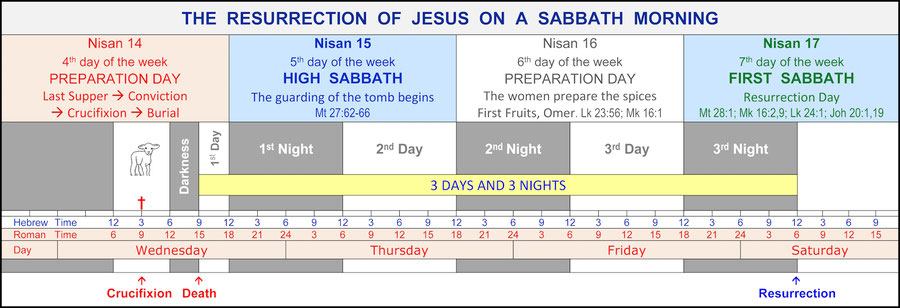
Luke 24:1 is one of those Bible verses that are very easy to understand. It says nothing else but that the women went to the tomb "on one of the Sabbaths". The plural form is not surprising, since there are three Sabbaths in one week according to the Passover holiday order. But the plural σαββατων was also often used in ancient Greek to describe a single Sabbath day in the singular (see Interlinear). If you want to add a feminine day behind the female mia, you are welcome to do so. So there are several right and wrong options to translate "μια των σαββατων":
Possible Translations:
τη μια των σαββατων (Original quotation)
on the one of the Sabbaths (=Literal translation)
on one of the Sabbaths
on the one of the Sabbath days
on one of the Sabbath days
on a day of the Sabbaths
on a Sabbath
on a Sabbath day
If "one" (mia) is replaced by "first" (prote):
on the first Sabbath
on the first Sabbath day
on the first of the Sabbaths
on the first of the Sabbath days
on the first day of the Sabbath
on the first day of the Sabbaths
Wrong Translations:
on Sunday
on Lord’s day
after the Sabbath
on the day after the Sabbath
after one of the Sabbaths
on a day of the week
on a Sunday
on a Lord’s day
If "one" (mia) is replaced by "first" (prote):
on the first day after the Sabbath
on the first day of the week
on the first Sunday
on the first of the Sundays
For all wrong translations shown in the right column there are own correspondences in the Greek language. Examples: On Sunday (την ημερα του ηλιου), "on the first day of the week" (την πρωτη ημερα της εβδομαδας), "on the first day after the Sabbath" (την πρωτη ημερα μετα το σαββατο). No man can explain why God speaks of "one of the Sabbaths" when in reality he should mean "not on one of the Sabbaths" but "on one of the Sundays"? Jesus is the Word of God in person and every word of the Bible must be translated as it appears in the original Greek text and not as theologians would like it to be. Often no translations were made, but replacements.
As is clearly seen above, theologians and pastors have erased two words from the Bible (one, Sabbath) and added six others (first, day, after, week, Sunday, Lord's Day). Thus a translation chaos was created (examples). The corresponding Greek words for "first," "after," "day," "week," "Sunday" or "Lord's Day" are not to be found in any Greek manuscript, although these words were known to everyone and could therefore have been used. Apparently the worst translation error in the history of mankind occurred (more info) with dramatic consequences. For through the alleged Sunday resurrection of Jesus, the sanctification of the Babylonian and Roman day of the Sun God (Sunday) has infiltrated Christianity.
The phrase "μια των σαββατων" can only mean a single day of the week and never two, with each person being able to choose the day they want. In no language does Sabbath and Sunday or week mean the same. It is very easy to expose this error, because if someone wants to say "on a Sabbath" or "on one of the Sabbaths" in ancient Greek, he must use the same words that Luke used. How can he then claim that a re-translation into English should result in "on a Sunday"? But for the description of an alleged resurrection of Jesus on a Sunday, there are many options, using quite different Greek words (see examples).
The Greek μια (mia, one) is a cardinal number and must never be exchanged with the ordinal number πρωτη (prote, first), otherwise God would have written it down in the NT if he wanted it. However, even if someone wants to replace mia with prote, he is welcome to do so in this case, because this is actually the "first Sabbath" after the High Sabbath (15th Nisan). It is also the "first Sabbath" of the seven weekly Sabbaths betwen Passover (15th Nisan) and Pentecost. That is why Mark named it exactly the same (Mark 16:9). But the word "Sabbath" must remain and must not be replaced. Although this is not the literal equivalent of "μια των σαββατων" (Mk 16:2; Lk 24:1; Jn 20:1; Acts 20:7), in terms of content it is nevertheless correct, since it is actually the first weekly Sabbath until Pentecost. When God speaks of the Sabbath, he also means the Sabbath and not the day after (Sunday). God has not mentioned Sunday once in the entire Bible, because he does not mean it and does not want it in the Bible. In God's calendar, the first day of the week (Sunday) has no special name, nor has it ever been blessed and sanctified by God, because this honour was only given to the Sabbath.
There are many correct translations
The Catholic Jerome (Vulgate 382) and many others after that, have translated clearly and correctly. The Vulgate served as the translation basis for many Bibles worldwide and many old Bibles have been translated correctly. Also the bibles that were translated from the Greek text have the same content: A good example is the Concordant Literal Version (CLV) 1926:
"Now in the early depths of one of the sabbaths, they, and certain others together with them, came to the tomb..."
Martin Luther also wrote literally that the women came to the tomb "on one of the Sabbaths" (an der Sabbather einem). Every child understands this. Nevertheless, there are several online Bibles that claim to show the text from 1522 or 1545; instead, the day of resurrection was simply moved back to the "first day of the week". Luther would certainly not be happy about this, because until the revision around 1900 the Resurrection Sabbath was printed millions of times in all Luther Bibles (Facsimiles). The first printed Bible in America in a national language (Saur Bible 1743) also had this message.
The Jehovah's Witnesses make it clear in their three-line interlinear translation (KIT 1985; The Kingdom Interlinear Translation of the Greek Scriptures) that their Bible is based on theologian teachings and not on the Word of God. Not only do they add the word "Jehovah" to the NT, but they also postpone the resurrection of Jesus to the desired Sunday. In the second column of this issue, they write that the Greek text literally means "one of the sabbaths" in English, but underneath they add the desired text of the New World Translation (NWT) with the replacements. They remove two words and add three others. In doing so, they (like the Pharisees) set God's Word aside in favour of their doctrine (Mark 7:9; Mt 15:8-9). Every young child in America, England, Ireland, Scotland and Australia can understand what "one of the Sabbaths" means and would never say that it means "the first day of the week" or "the Sunday":


It is interesting to see how the King James Bible has reproduced Lk 24:1 in comparison to Acts 16:13. In Lk 24:1 the word "day" (ημερα, hemera) is added, which results in exactly the same expression as in Acts 16:13, namely "day of the Sabbaths" in the plural. Here the correct translation is "on the sabbath" the singular. So the King James Bible should consequently have translated also Lk 24:1 correctly, which would exactly match Mk 16:9:
The so famous King James Bible makes dramatic mistakes. In Acts 16:13 it simply omits the word "day", although it is written in the Bible, but in Lk 24:1 it adds the word "day" to the Bible, although it is not written in the NT. So the translators knew perfectly well that the Greek expression "day of the Sabbaths" in the plural means the Sabbath day in the singular, for they themselves translated this correctly in Acts 16:13. But if also Lk 24,1 had been translated correctly, then it would mean that Jesus would have risen "on a Sabbath", and that is exactly what neither the English king nor his Anglican church wanted. They wanted to see Sunday in the Bible, so they replaced "mia" with "prote", added the word "hemera" (day) to the Bible and replaced the day of God "Sabbath", which has been clearly defined for 6,000 years, with a period of seven days: "week". And already millions of Christians have fallen for this fraud.
There are very many good and exact German Bibles. An exception is the modern Volxbibel 2004, because it shows the greatest joke; it not only adds Sunday to the Bible, but also emphasizes that it was NOT on the Sabbath:
"On Sunday, when the religious holiday Sabbath was over, the women walked very early..."
„Am Sonntag, als der religiöse Feiertag Sabbat vorbei war, gingen die Frauen ganz früh...“
Who can find the corresponding words for "Sunday" and "was over" in the basic Greek text? The devil perhaps? No, he can't see them here either. We can find in all the Greek manuscripts in Lk 24:1 only the words "on the Sabbath/s". The Sabbath was rightly mentioned in the translation, the other words marked in red were simply added. It is shocking what some people make with the Word of God.
In contrast to this there are also many old and completely new Bibles, which are correctly translated in Lk 24:1. Here an example from the free program ISA3 from Scripture4All (Link):
The Colored Scriptures show in several languages the resurrection of Jesus "on one of the Sabbaths":
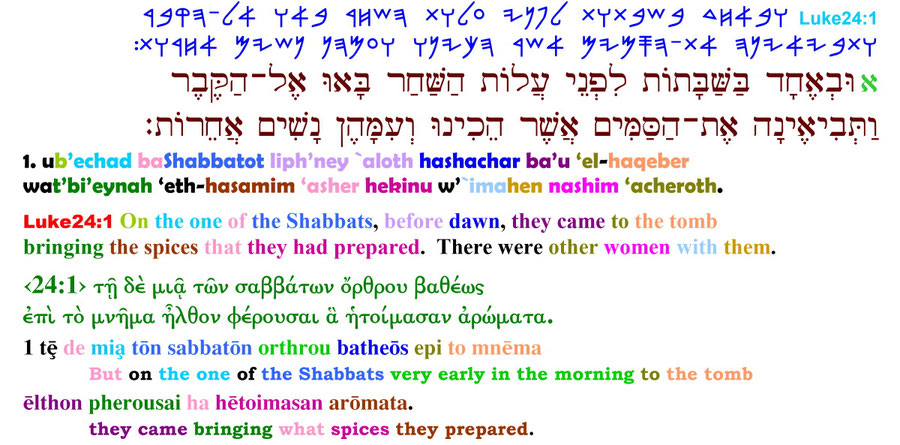
The Google Translation Confirms the Sabbath (Saturday)
Google's well-known translation program makes it clear to everyone that the Bible reports that the women came to the grave "on one of the Saturdays" (not "on one of the Sundays"). This way of speaking is easy to understand, since there are always three Sabbaths during the Passover. In addition, each year the seven weekly Sabbaths between Passover (15th Nisan) and the third annual High Sabbath of Pentecost are counted:
The DeepL Translation Confirms the Sabbath (Saturday)
The free internet translation programme from DeepL is even more accurate. It proves how easy the Greek text is to understand. Only the "one Sabbath", the "one of the Sabbaths" or "a/one Saturday" is meant:
This is how it should have been written in the basic Greek text if it meant the "first day of the week" and not "the one of the Sabbaths":
MANY BIBLES REVEAL THE RESURRECTION SABBATH
There are more than 150 historical and contemporary Bibles worldwide (see facsimiles), which for many centuries have described the coming of women to the tomb "on a Sabbath" or "on the first Sabbath". This includes many old Catholic translations. So when a Christian today says that it is written in the Bible that Jesus rose from the dead "on a Sabbath" or "on one of the Sabbaths" or "on the first of the [seven] Sabbaths" until Pentecost, he is not spreading a new false doctrine, but an ancient Christian and Catholic basic knowledge that has been proclaimed here for almost 2,000 years, not orally but in writing (in the Bible).

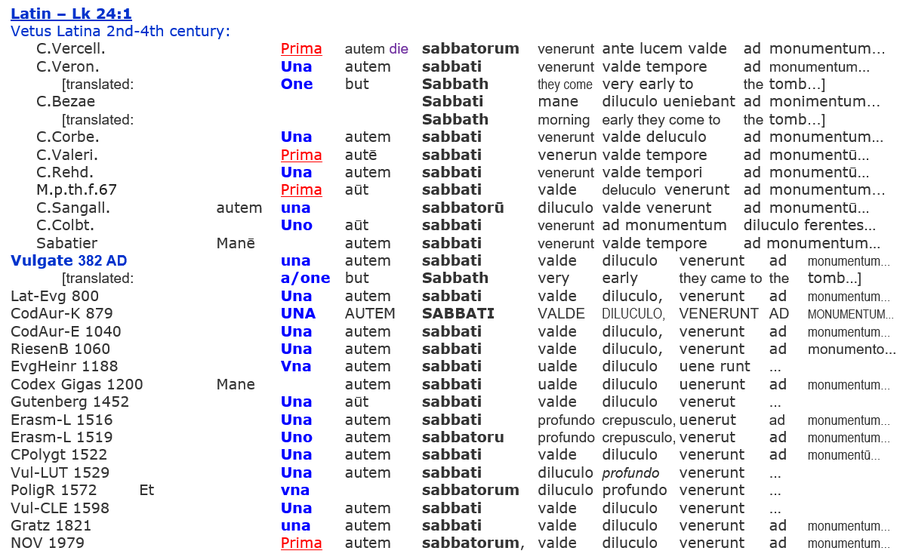
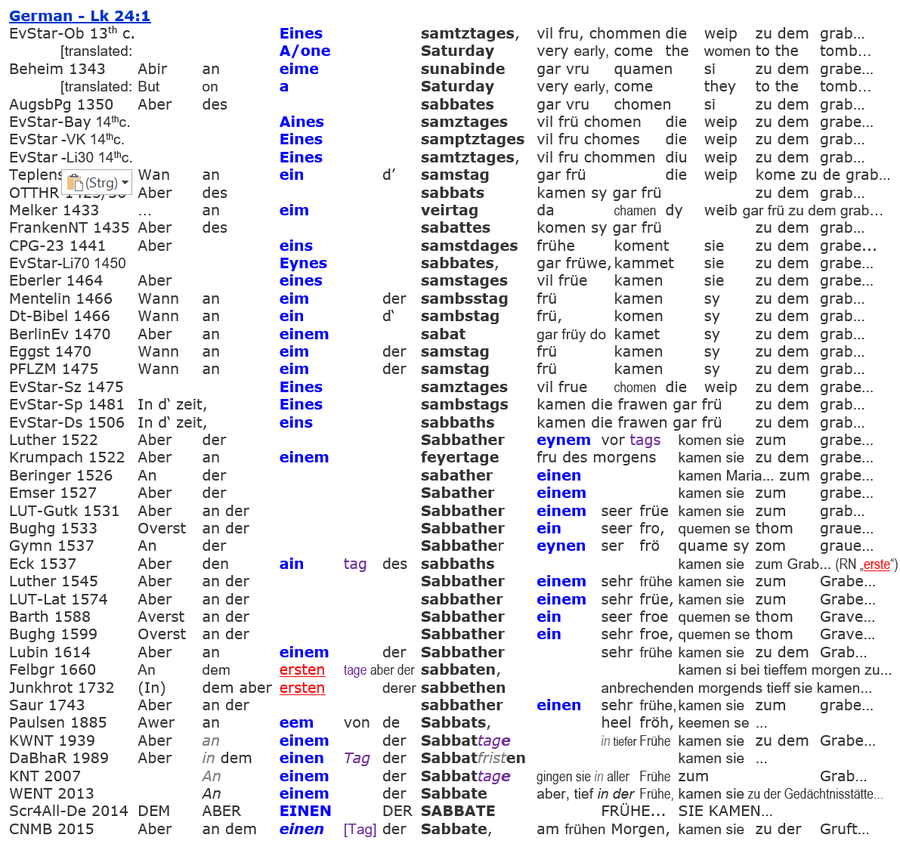
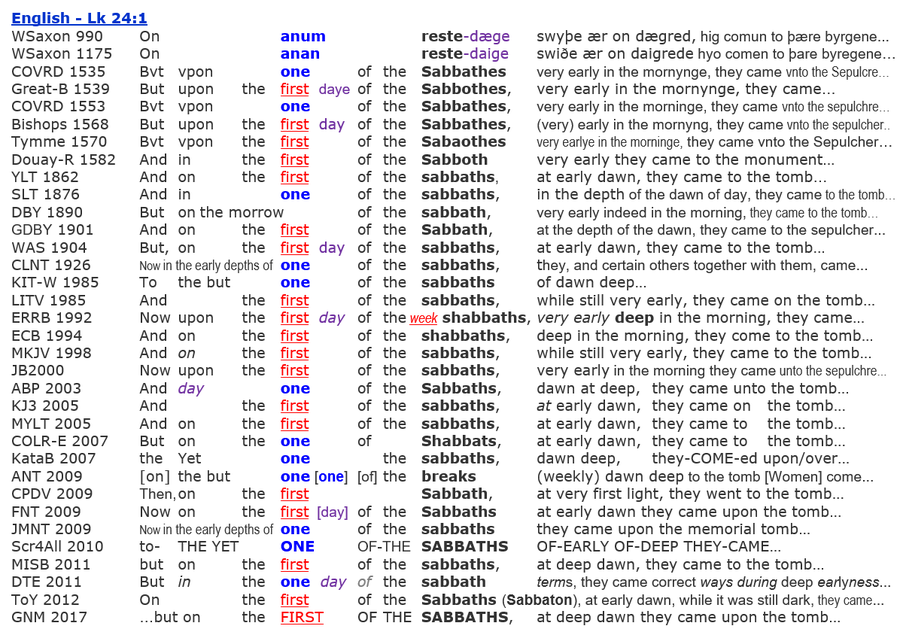
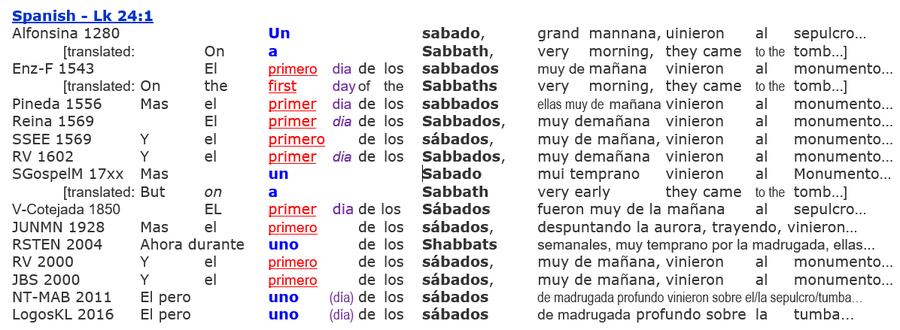








Resurrection on a day of the week
There are also some Bible translations which report in general terms of "one day of the week" without defining which day of the week is meant. Both the Sabbath and Sunday are one day of the week, so this phrase is not only confusing but also wrong, because the basic Greek text only mentions the Sabbath.

INCORRECT TRANSLATIONS WHICH ERASE THE SABBATH IN Lk 24:1
As can be clearly seen, a chaos of translations has developed over the centuries. It is absolutely impossible that the one basic Greek text offers two different resurrection days of Jesus, from which every Christian can choose one that he would like to have. This diversity of the most diverse and contradictory translations makes it clear that we can speak of a deliberate falsification of the Word of God. The closer we get to the coming of Jesus Christ and the Rapture, the more Bibles dare to erase the Sabbath from the Bible and replace it with the unbiblical word "Sunday". Up to now no human being has succeeded for 2,000 years in finding the corresponding Greek words for "after", "week", "Lord's Day" and "Sunday" in the basic text of Lk 24:1.
And the reality is even worse, because some Bible programs even translate old correct German, Spanish, Italian, Swedish or Czech Bibles incorrectly (see old Bibles), because they now always turn „on a/first Sabbath/Saturday“ or „on the one/first of the Sabbaths/Saturdays“ into „on the first day of the week“ or „on a Sunday“. In concrete terms, this means that not only the statements of the ancient languages Greek and Latin are being falsified, but also those of the modern languages, where Bibles that have already been correctly translated into national languages are being falsified again. Apparently, you cannot speak of a Sabbath or Saturday in any language in the world because it supposedly always means „on the first day of the week“ or „on a Sunday“. This shows how demonic the whole thinking of some people is. They cannot be convinced by arguments, but want to see Sunday in the Bible with all their might and by force. They come up with the craziest arguments just to seduce the Bride of Christ and take her away from God's biblical calendar with its feast days to ancient pagan feast days that are not mentioned once in the entire Bible.
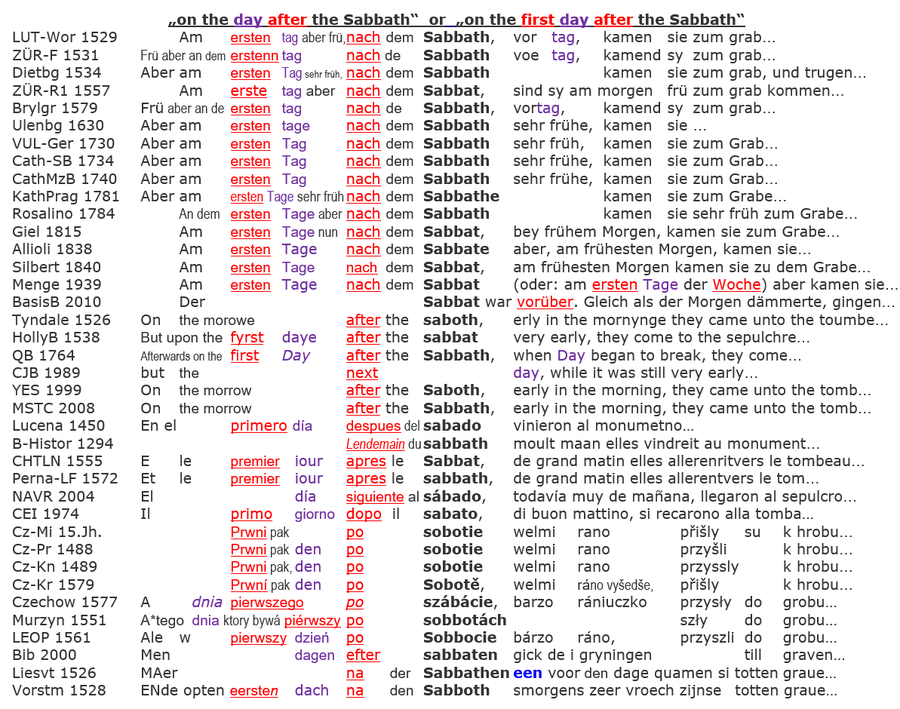
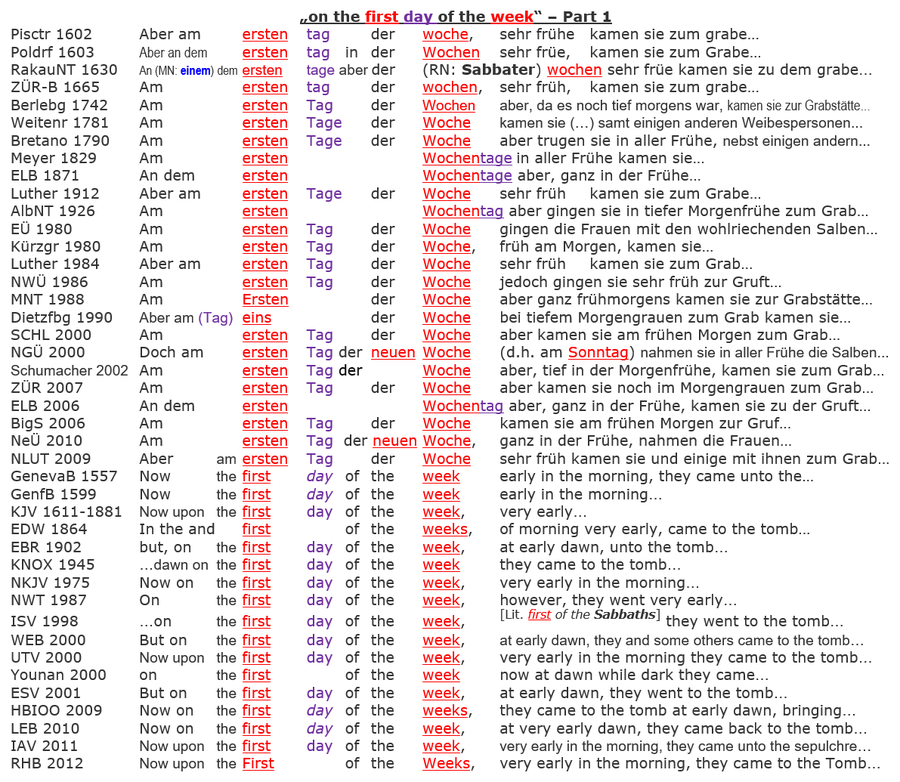
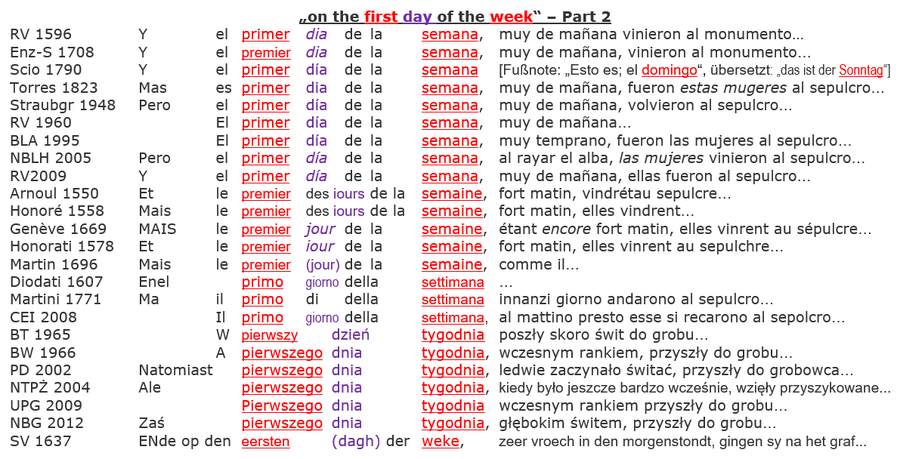
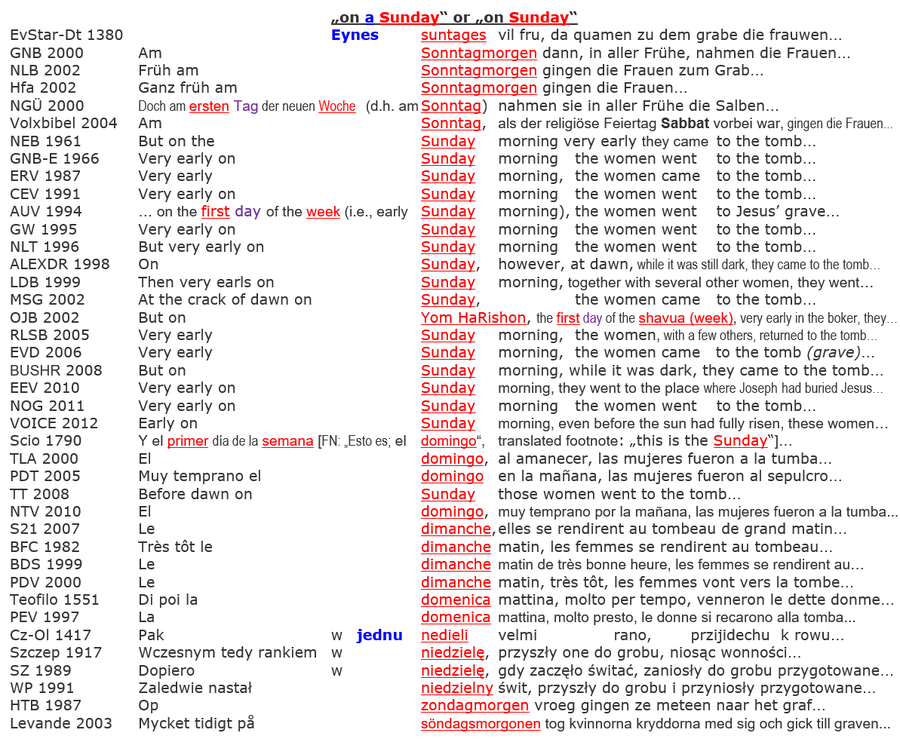
For the list of abbreviations of the Bibles see link. The original copies of most Bibles can
be downloaded as facsimiles from the Internet free of charge
(see Historical Bibles).
„Prove all things; hold fast that which is good. Abstain from all appearance of evil“
(1Thess 5:21-22)
„Take no part in the unfruitful works of darkness, but instead expose them“
(Epheser 5:11)







